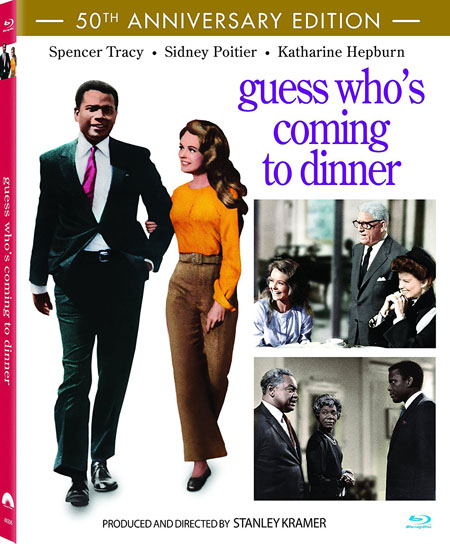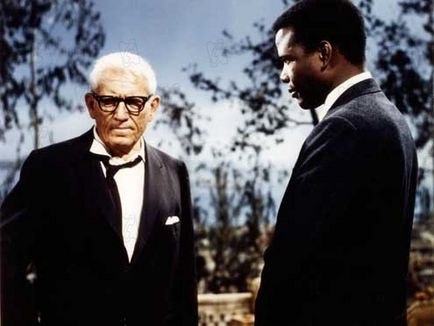
“THAT’S THE GLORY OF
LOVEâ€
By Raymond Benson
“You’ve got to live a
little, take a little, and let your poor heart break a little—that’s the story
of, that’s the glory of love.â€
The
popular opening song by Billy Hill and sung by Jacqueline Fontaine, “The Glory
of Love,†sets the tone for this classic, delightful motion picture that
addressed a social issue at the time that we take for granted today—interracial
marriage. Hey, in 1967, this was a hot topic. The Supreme Court had decided the
Loving vs. Virginia case, which
prohibited states from criminalizing interracial marriage, only six months
prior to the film’s release (and that legal battle is dramatized in the film Loving, currently in cinemas). Guess Who’s Coming to Dinner was indeed
timely, certainly controversial in more conservative areas of the country, and
a powerful statement about tolerance and the rights of American citizens.
The
comedy/drama was a hit and was nominated for ten Academy Awards, including Best
Picture, Director (Kramer), Actor (Spencer Tracy), Actress (Katharine Hepburn),
Supporting Actor (Cecil Kellaway), and Supporting Actress (Beah Richards). It
won only two—Hepburn took home the prize, and William Rose was honored for his
intelligent and warm Original Screenplay.
Stanley
Kramer produced many “important†pictures before taking up the directing chores
himself in the late 50s, and he often tackled difficult social issues—racial
issues in The Defiant Ones (1958),
nuclear war in On the Beach (1959),
the teaching of evolution in schools in Inherit
the Wind (1960), and the Holocaust in Judgment
at Nuremberg (1961). He seems to have been just the man for the job, as
this new 50th Anniversary Blu-ray release emphasizes—there are three separate
supplements on the disk about Kramer himself, plus an appearance by his widow
Karen in an introduction to the film, as well as his presence in two more
featurettes about the making of the picture.
For
anyone who’s never seen this wonderful movie, it concerns an upper class
liberal couple (Tracy and Hepburn) whose daughter (Katharine Houghton, who
happens to be Hepburn’s real-life niece) has surprised them with her engagement
to a black doctor (Sidney Poitier). Suddenly, the parents’ liberal attitudes
are challenged and they’re not so sure this is a good idea. Complicating the
matter, the daughter has invited her fiancé’s parents (Roy E.
Glenn and Beah Richards) to join them for dinner to “meet the in-laws.†A
cordial white priest (Kellaway) and a feisty black housekeeper (Isabel Sanford)
add to the crisis of musical chairs. It’s a talky film that takes place mostly
indoors in the family’s home—it would have made a terrific stage play—but
Kramer’s deft hand at directing keeps everything fresh. This is a film about
the writing and the acting, and everyone is terrific.

The
only mild criticism I would have—and it echoes that of many critics at the
time—is that Poitier’s character is too perfect. Apparently Kramer and the
screenwriter did that on purpose so there would be no way anyone, that is,
anyone white, could object to him.
After all, Kramer had no idea what kind of backlash the film would receive upon
release.
Tracy
was extremely ill during the filming; in fact, he couldn’t be insured. Hepburn
and Kramer had to guarantee their salaries as collateral to get the film made.
Tracy died about two weeks after the production wrapped. It’s one of his
greatest performances. His final speech at the end of the movie to the rest of
the cast concerning his “decision†about the marriage is sure to well up any
viewer’s eyes. Poitier is very good as well—1967 was his year, as the actor had
also appeared in To Sir, With Love and
In the Heat of the Night along with Guess Who’s Coming to Dinner. Hepburn
steals the film, though, if that is possible opposite Tracy and Poitier. Her
eyes maintain that fine line between almost-crying and bawling throughout the
picture. It’s a magnificent performance.
The Sony Blu-ray (to be released February 7) looks splendid in its 1080p High Definition glory with a 5.1 DTS-HD
Master Audio. It comes in a deluxe digibook with plenty of photos and an essay
by Gil Robertson. The problem with the disk itself is that there are no new
supplements—they’re all ported over from the 40th Anniversary DVD... but if you’ve never seen them, they’re all
quite well done. You have a choice of four different introductions to the
film—the previously mentioned one with Karen Kramer, and others each by Steven
Spielberg, Quincy Jones, and Tom Brokaw. Along with the featurettes about the
film and Stanley Kramer, you get a gallery of photos and the theatrical
trailer.
Guess Who’s Coming to
Dinner is
a milestone from the late 1960s—a relic of a turbulent time in America’s
history, but also an often funny—and gently principled—entertainment.
CLICK HERE TO ORDER FROM AMAZON